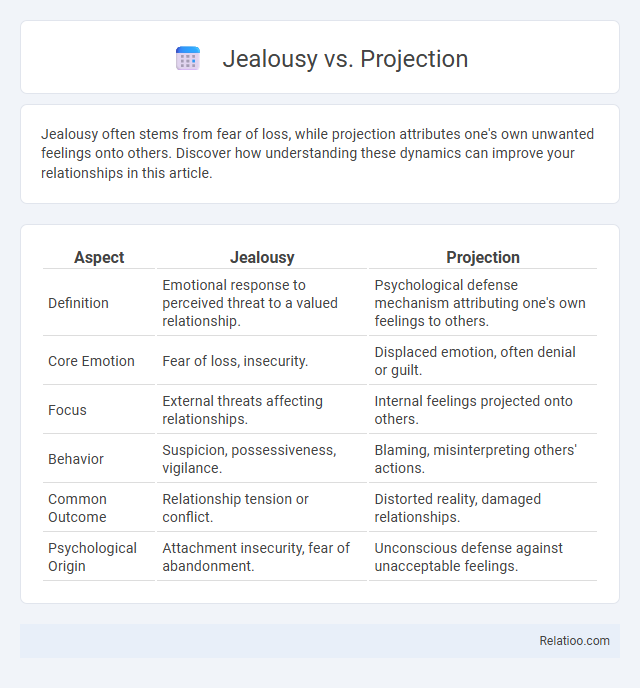Jealousy often stems from fear of loss, while projection attributes one's own unwanted feelings onto others. Discover how understanding these dynamics can improve your relationships in this article.
Table of Comparison
| Aspect | Jealousy | Projection |
|---|---|---|
| Definition | Emotional response to perceived threat to a valued relationship. | Psychological defense mechanism attributing one's own feelings to others. |
| Core Emotion | Fear of loss, insecurity. | Displaced emotion, often denial or guilt. |
| Focus | External threats affecting relationships. | Internal feelings projected onto others. |
| Behavior | Suspicion, possessiveness, vigilance. | Blaming, misinterpreting others' actions. |
| Common Outcome | Relationship tension or conflict. | Distorted reality, damaged relationships. |
| Psychological Origin | Attachment insecurity, fear of abandonment. | Unconscious defense against unacceptable feelings. |
Understanding Jealousy: Definition and Triggers
Jealousy is an emotional response characterized by fear of losing something valuable, often triggered by perceived threats to a relationship or personal status. It arises from insecurity, low self-esteem, or fear of abandonment, distinguishing it from projection, which involves attributing one's own unwanted feelings onto others, and displacement, where emotions are redirected towards a safer target. Understanding jealousy requires recognizing its root causes, such as insecurity and fear, to effectively manage and address the emotional turmoil it creates.
Decoding Projection: What Does It Really Mean?
Projection involves attributing your own unwanted feelings or thoughts onto someone else, often as a defense mechanism to avoid confronting internal conflicts. Unlike jealousy, which centers on fear of losing something valuable, projection distorts reality by externalizing personal emotions that may feel threatening or unacceptable. Understanding projection enables you to recognize these subconscious transfers, helping decode your reactions and fostering emotional self-awareness.
Psychological Roots: Where Jealousy and Projection Begin
Jealousy originates from fear of losing valued relationships or resources, deeply rooted in personal insecurities and attachment issues. Projection arises when individuals unconsciously attribute their own unacceptable feelings or desires onto others as a defense mechanism. Displacement involves redirecting emotional responses from a threatening target to a safer substitute, often stemming from unresolved internal conflicts or stress.
Key Differences Between Jealousy and Projection
Jealousy involves a fear of losing something valuable, typically a relationship, to a perceived rival, while projection is a defense mechanism where individuals attribute their own unacceptable thoughts or feelings onto others. The key difference lies in jealousy being a reaction to external threats to self-esteem or relationships, whereas projection redirects internal conflicts outward to avoid self-awareness. Understanding these distinctions helps in identifying emotional responses and managing interpersonal dynamics effectively.
Common Scenarios: Jealousy vs Projection in Relationships
Jealousy often manifests in relationships when You perceive a threat to your emotional bond, such as feeling insecure about a partner's interactions with others. Projection occurs when someone attributes their own feelings of envy or distrust onto their partner, accusing them of behaviors they themselves are grappling with. Displacement involves redirecting feelings of jealousy or frustration from the source onto a safer target, like expressing anger toward a friend instead of addressing underlying insecurities within the relationship.
Emotional Signs: How to Recognize Each
Jealousy often manifests through intense feelings of insecurity, possessiveness, and fear of losing something valuable, accompanied by constant comparison and vigilance toward perceived rivals. Projection involves attributing one's own unacceptable emotions or impulses, such as anger or guilt, onto others, often resulting in accusatory behavior and misinterpretation of others' intentions. Displacement is characterized by redirecting emotional responses, like frustration or aggression, from the original source toward a safer or more convenient target, leading to sudden outbursts or disproportionate reactions.
Impact on Mental Health and Well-Being
Jealousy often triggers anxiety and low self-esteem, leading to chronic stress and deteriorating mental health. Projection distorts self-awareness by attributing one's unacceptable feelings to others, exacerbating interpersonal conflicts and fostering confusion or resentment. Displacement redirects emotions from the original source to safer targets, which can result in unresolved anger and increased emotional distress, ultimately undermining overall well-being.
Strategies to Manage Jealousy and Projection
Managing jealousy and projection requires recognizing and addressing underlying emotional triggers through self-awareness and cognitive restructuring techniques. Strategies such as mindfulness meditation, journaling emotions, and seeking professional therapy help individuals identify distorted thoughts and reframe negative perceptions. Developing strong communication skills and setting healthy boundaries further reduce the impact of jealousy and prevent projections onto others.
Seeking Professional Help: When Emotions Overwhelm
Seeking professional help is crucial when jealousy, projection, or displacement cause emotional distress that disrupts daily functioning. Therapists skilled in cognitive-behavioral therapy (CBT) and psychodynamic approaches can help individuals understand and manage these complex emotions effectively. Early intervention through counseling can prevent these defense mechanisms from escalating into chronic anxiety or relationship issues.
Building Healthy Relationships: Moving Beyond Jealousy and Projection
Jealousy, projection, and displacement are emotional responses that can undermine trust and communication in relationships. Understanding these psychological dynamics allows individuals to address insecurities and redirect negative feelings constructively, fostering empathy and openness. Building healthy relationships requires self-awareness and emotional regulation to move beyond jealousy and projection, creating a foundation of mutual respect and stability.

Infographic: Jealousy vs Projection
 relatioo.com
relatioo.com